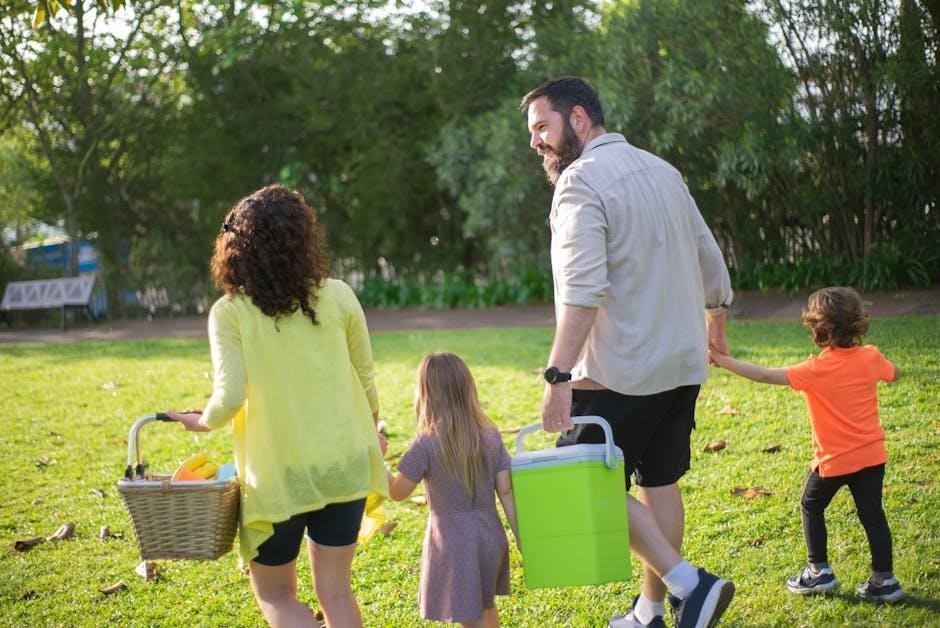parents guide the walking dead
This guide helps parents navigate The Walking Dead’s mature themes, violence, and emotional depth, offering tools for informed decisions and fostering open discussions about its suitability for children.
1.1 Understanding the Purpose of the Guide
This guide aims to help parents assess The Walking Dead’s content, ensuring informed decisions about its suitability for children. It provides insights into age-appropriateness, themes, and tools to foster meaningful discussions, supporting parents in guiding their children’s media consumption effectively.
1.2 Importance of Parental Involvement in Media Consumption
Active parental involvement ensures children navigate media responsibly. By monitoring content like The Walking Dead, parents can guide discussions on violence, ethics, and emotional themes, fostering critical thinking and moral understanding while protecting young viewers from unsuitable material.
Key Considerations for Parents
Evaluating content suitability, ensuring age-appropriateness, and understanding themes like violence and morality are crucial for parents to guide their child’s viewing experience and foster meaningful discussions.
2.1 Assessing Age Appropriateness
Parents should evaluate their child’s maturity to determine if they can handle The Walking Dead’s graphic violence and complex themes. Considering factors like emotional resilience and understanding of fiction versus reality helps ensure the content aligns with their child’s developmental stage and sensitivity levels appropriately.
2.2 Evaluating Content for Sensitivity
Evaluate The Walking Dead’s content for sensitivity by reviewing its depiction of violence, gore, and emotional distress. Parents should consider their child’s emotional resilience and ability to distinguish between fiction and reality to ensure the show’s intense scenes do not cause lasting distress or fear.
2.3 Understanding the Show’s Themes
The Walking Dead explores complex themes like survival, morality, and humanity in a post-apocalyptic world. Parents should be aware of these mature concepts, as they offer opportunities for discussions about ethics, decision-making, and resilience, while also requiring guidance to help children process the show’s intense narrative and emotional depth.

Violence and Gore in The Walking Dead
The Walking Dead features graphic violence and gore, including bloodshed and gruesome scenes, making it essential for parents to assess its suitability for their children and provide guidance.
3;1 The Nature of Violence in the Show
The Walking Dead depicts intense violence, including zombie attacks, character conflicts, and survival struggles. The graphic nature of these scenes is central to the narrative, aiming to convey survival instincts and moral dilemmas, but may be distressing for young viewers without proper context and parental guidance.
3.2 Gore and Its Impact on Young Viewers
The show’s graphic gore, including bloodshed and mutilation, can deeply affect young viewers, potentially causing fear, anxiety, or desensitization. Parents should assess their child’s maturity and sensitivity before allowing exposure, as such content may lead to lasting emotional impressions and questions about reality versus fiction.
3.3 How to Address Violence with Your Child
Encourage open dialogue about the show’s violent scenes, helping your child differentiate between fiction and reality. Discuss the consequences of violence and its impact on characters, fostering empathy and critical thinking. Use these moments to guide your child toward understanding the moral implications and emotional toll of such actions.

Mature Themes and Their Implications
The Walking Dead explores complex issues like moral dilemmas, survival ethics, and leadership decisions, which can spark meaningful conversations about right and wrong, preparing children for real-world challenges.
4.1 Exploring Moral Dilemmas
The Walking Dead often presents characters with tough choices, forcing them to confront right and wrong in extreme survival situations. Parents can use these scenarios to discuss ethical decision-making, empathy, and the consequences of actions, helping children develop a moral compass in complex, real-world contexts.
4.2 The Portrayal of Survival Ethics
The Walking Dead explores survival ethics through characters’ tough decisions, such as stealing, sacrificing others, or lying to survive. These scenarios spark discussions about morality, guilt, and the consequences of actions, helping parents guide children in understanding the balance between survival instincts and moral principles in extreme situations.
4.3 The Role of Leadership and Decision-Making
The Walking Dead portrays leadership through characters facing complex moral dilemmas, making tough decisions, and leading groups amidst chaos. Parents can use these storylines to discuss leadership qualities, responsibility, and the consequences of decisions, fostering critical thinking and moral understanding in their children through open dialogue and reflection on ethical decision-making.

Parental Discretion and Guidance
Parents must actively monitor their child’s media intake, using tools like content reviews and open conversations to ensure The Walking Dead aligns with their values and maturity levels, fostering informed viewing habits and critical thinking through guided discussions about the show’s themes and suitability.
5.1 When and How to Intervene
Parents should intervene when their child shows signs of distress or confusion due to The Walking Dead’s graphic content. Engage in open, empathetic conversations to address concerns, ensuring discussions are age-appropriate. Use these moments to guide their understanding and help them process complex emotions, fostering a safe space for reflection and questioning. Tailor interventions to your child’s sensitivity and maturity level, ensuring they feel supported while exploring the show’s themes.
5.2 Using the Show as a Teaching Tool
The Walking Dead can serve as a powerful educational resource, sparking discussions on morality, survival ethics, and leadership. Parents can use specific episodes to explore complex themes, encouraging critical thinking and empathy. This approach helps children analyze fictional scenarios while connecting them to real-world values and decision-making processes.
5.3 Encouraging Critical Thinking
Encourage children to analyze The Walking Dead’s complex themes, such as moral dilemmas and survival ethics, by asking open-ended questions. Discuss how characters’ decisions reflect real-world values and consequences. This fosters deeper understanding and helps develop critical thinking skills, preparing them to evaluate challenging scenarios in their own lives thoughtfully.

The Walking Dead’s Cultural and Social Context
The Walking Dead’s immense popularity highlights its cultural relevance, sparking discussions on survival ethics and human nature, while reflecting real-world social issues and societal fears.
6.1 The Show’s Popularity and Influence
The Walking Dead’s massive following underscores its cultural impact, attracting millions of viewers and inspiring countless fan communities. Its influence extends beyond TV, shaping media trends and sparking conversations about survival, ethics, and humanity in a post-apocalyptic world, making it a significant cultural phenomenon for both critics and audiences alike.
6.2 Its Impact on Popular Culture
The Walking Dead has profoundly influenced popular culture, inspiring numerous spin-offs, merchandise, and fan art. It has redefined the zombie genre, shaping how audiences perceive apocalyptic narratives. Its themes of survival and moral dilemmas have sparked widespread discussions, cementing its place as a cultural icon in modern entertainment and media.
6.3 How It Reflects Real-World Issues
The Walking Dead mirrors real-world challenges like disaster response, pandemic fears, and societal collapse. It explores human behavior under stress, highlighting themes of community, leadership, and survival ethics. The show also reflects issues of diversity, inequality, and moral ambiguity, offering a lens to discuss complex, relatable dilemmas in a fictional yet impactful context.

Navigating the Show’s Emotional Landscape
The Walking Dead explores intense emotional struggles, loss, and resilience; Parents can help children process these themes by discussing emotional triggers and fostering open conversations about fear, grief, and hope, while reassuring them of the show’s fictional nature.
7.1 Understanding Emotional Triggers
Parents should identify scenes in The Walking Dead that may trigger strong emotions in children, such as loss, fear, or anxiety. By recognizing these moments, caregivers can prepare discussions to help kids process feelings and differentiate between the show’s fictional events and real-life experiences, fostering emotional resilience and understanding.
7.2 Managing Fear and Anxiety
The Walking Dead can evoke intense fear and anxiety in children due to its graphic content. Parents should reassure kids that the show is fictional, discuss its context, and encourage open conversations about their emotions. Setting boundaries and offering comfort can help mitigate overwhelming feelings and foster resilience.
7.3 Discussing Emotional Responses with Your Child
Encourage open dialogue by asking your child how they feel about specific scenes. Listen actively and validate their emotions, while guiding discussions on themes like morality or loss. This helps them process complex feelings and fosters empathy and critical thinking about the show’s intense content.

The Role of Community and Relationships
The show highlights the importance of teamwork, trust, and unity for survival. Use this to discuss with your child how relationships and community bonds foster resilience and empathy in challenging situations.
8.1 The Importance of Human Connection
The Walking Dead emphasizes how human bonds provide emotional support and strength in dire situations, allowing parents to teach children the value of empathy and collaboration, essential for building strong relationships and fostering resilience in real-life challenges.
8.2 Building and Maintaining Trust
The Walking Dead highlights trust as a survival cornerstone, showing characters relying on each other for safety and emotional stability. Parents can use this to discuss trust’s importance, teaching children how to build and maintain healthy, dependable relationships in their own lives through open communication and mutual respect.
8.3 Sacrifices for the Greater Good
The Walking Dead often portrays difficult decisions where characters sacrifice personal interests for the group’s survival. This theme offers parents a chance to explore moral dilemmas with their children, fostering discussions on selflessness, responsibility, and the ethical implications of prioritizing the greater good over individual desires.

Resources for Parents
Parents can access detailed guides, reviews, and tools to evaluate The Walking Dead’s content, ensuring informed decisions about their child’s media consumption and understanding its suitability.
9.1 Parental Reviews and Ratings
Parental reviews and ratings provide insights into The Walking Dead’s suitability for children, highlighting content concerns like violence and gore. Platforms like Common Sense Media and IMDB offer detailed assessments, helping parents make informed decisions about their child’s exposure to the show’s mature themes and graphic content.
9.2 Educational Guides and Tools
Educational guides and tools, such as search query generators and media literacy resources, empower parents to analyze The Walking Dead’s content. These tools offer practical advice on assessing themes, violence, and emotional impact, ensuring informed decisions about viewing suitability while fostering critical thinking and open dialogue with children.
9.3 Community Discussions and Forums
Online forums and discussions provide a platform for parents to share insights and experiences about The Walking Dead. These communities offer diverse perspectives, helping parents gauge the show’s suitability for their children and fostering dialogue about its themes, violence, and emotional content.

Watching The Walking Dead Together
Co-viewing The Walking Dead with your child creates opportunities for dialogue, helping you guide them through its intense themes while fostering a shared understanding of its complex narrative.
10.1 Creating a Safe Viewing Environment
Establish a comfortable space for viewing, ensuring your child feels secure; Assess their readiness based on age and sensitivity. Use this opportunity to discuss the show’s nature, helping them differentiate between fiction and reality. Foster an open dialogue to address any fears or questions they may have during or after watching.
10.2 Encouraging Open Dialogue
Engage your child by asking open-ended questions about the show, such as their thoughts on characters’ decisions or how they feel about specific scenes. This fosters critical thinking and emotional processing. Encourage them to express concerns or questions, providing reassurance and context to help them understand the show’s themes and violence.
10.3 Shared Learning Experiences
Watching The Walking Dead together creates a shared experience, fostering bonding and deeper understanding. Use specific scenes to explore complex themes like survival ethics or moral dilemmas, encouraging your child to reflect on the characters’ decisions and their implications. This shared engagement allows for meaningful discussions and mutual learning.
This guide provides essential insights for parents to navigate The Walking Dead’s complex themes, ensuring a balanced approach to entertainment and education while fostering open dialogue with their children.
11.1 Summarizing Key Takeaways
This guide emphasizes the importance of parental involvement in monitoring The Walking Dead’s mature content, including violence, gore, and complex themes. It encourages open dialogue, critical thinking, and using the show as a teaching tool while ensuring age-appropriateness and sensitivity to individual child needs.
11.2 Final Thoughts on Parental Guidance
Parental guidance is crucial when introducing children to The Walking Dead. Balancing mature content with age-appropriate sensitivity ensures a thoughtful viewing experience. Open dialogue and critical reflection help children navigate complex themes, fostering emotional resilience and ethical understanding while respecting individual sensitivities and developmental stages.
